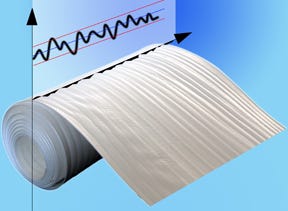Extrusion advances in the pipeline: degassing demystified, and wave-less foam
Last week we reported on two of the injection molding technologies being advanced at the Institute for Plastics Processing (IKV; Aachen, Germany). This article continues with two of the extrusion-related developments ongoing at the Institute and highlighted during a tour there in late October.
November 5, 2009
Last week we reported on two of the injection molding technologies being advanced at the Institute for Plastics Processing (IKV; Aachen, Germany). This article continues with two of the extrusion-related developments ongoing at the Institute and highlighted during a tour there in late October.
One of these is a control system that will monitor an extruder’s melt as it is de-gassed and be able to compensate for hydrolytic degradation in the plasticizing section of the extruder. The first group to benefit would most likely by processors of polyethylene terephthalate (PET) and polyamide (PA). “Our goal is to control the viscosity of the melt so that, even during de-gassing, the properties of the melt aren’t reduced, and that even when you have recyclate in the melt,” explained Walter Michaeli, director of the IKV.
|
The work is based on the premise that extrusion with melt degassing is an inexpensive alternative to pre-drying of hydrophilic materials such as PET. No matter how much a plastic is dried, or whether melt degassing is used, the moisture content of the raw material is not constant, which can cause issues during processing as the moisture has a direct influence on hydrolytic degradation in the plasticizing section of the extruder. Degassing only compensates for some of the fluctuation in the melt’s consistency.
These fluctuations cannot be fully offset through the degassing, which means that it has not so far been possible to guarantee a homogeneous product quality. The IKV is thus looking into a new type of control system with the aim of compensating for these fluctuations. Given that product quality is essentially determined by the molecular weight, which correlates directly with the flow behavior of the polymer, measuring the melt viscosity in a bypass rheometer makes it possible to estimate the product quality online.
If the measured value deviates from the setpoint value, the control system will intervene directly by modifying the degassing pressure. Since the melt viscosity is not only a function of the molecular weight but also dependant on the melt temperature, a temperature-dependent viscosity correction is first required in order to prevent any misinterpretation by the control system.
Simulation of the control behavior has been done in parallel with real-world testing which revealed that the simulation generally agreed with the actual tests. The control system is fundamentally transferable to twin-screw extruders too. The die pressure has also been implemented as a further control variable, obviating the need for a rheometer. Work continues. The IKV will present this development and all of its other work during its 25th annual International Plastics Technology Colloquium on March 3-4, 2010, with all of the presentations made and the machine demonstrations explained in both English and German.
Wave goodbye to waves on your sheet
Another development is a means to reduce "wave" formation in extruded foam sheet. Two objectives are being pursued in the project. First up is identifying the reason(s) for the formation of the waves. This involves the investigation of the general foaming behavior and the development of a wave-formation model. This model will subsequently be verified in live trials. The second objective of the project is to develop measures designed to minimize wave formation. Alongside the die orifice geometry, the downstream equipment’s design also will be considered. —Matt Defosse
About the Author(s)
You May Also Like



